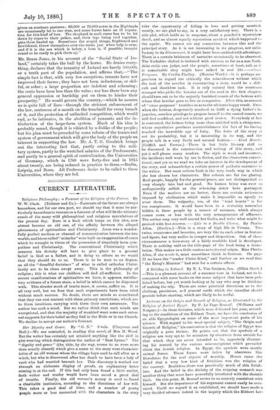Her Dignity and Grace By "C. N." 3 vols. (Chapman
and Hall.)—We are reminded, in reading this novel, of Mrs. H. Wood. But the writer has certainly not attained anything like the skill in plot-weaving which distinguishes the author of "East Lynne." The "dignity and grace" (the, title, by the way, seems to us even more than usually absurd) which give a name to the story were character- istics of an old woman whom the village boys used to call after as a witch, but who is discovered after her death to have been a lady of rank who had married beneath her. This discovery is worked out through an elaborate display of proofs, an explanatory letter -coming in at the end. If this had only been found a little earlier, thoth writer and reader would have been saved a great deal 'of trouble. Finally, the old woman's money is used to found .a charitable institution, according to the directions of her will. 'This takes a good deal of time, and a number of young petiole more or less connected with the characters in the story
take the opportunity of falling in love and getting married,
mostly, we are glad to say, in a very satisfactory way. There is a side plot, which holds us in suspense, about a poacher's mysterious death, and an almost equally mysterious accident which happened to the squire. We cannot see any connection between this and the principal story. As it is not interesting in its progress, nor satis- factory in its denouement, it might have been omitted with advantage. There is a certain briskness of narrative occasionally to be observed. The Yorkshire dialect is imitated with success, as far as a non-York- shire critic can judge, and the people, sometimes at least, talk as it is conceivable they might have talked in real life.—C,OSR Purposes. By Cecilia Findlay. (Marcus Ward.)—It is perhaps un- gracious to regard too critically the coincidences without which the task of the novelist in constructing a story would ho a diffi- cult and thankless task. It is only natural that the courteous stranger who picks the heroine out of the mud in the first chapter, should turn out to be the unjustly banished cousin of the heiress with whom that heroine goes to live as companion. After this, no amount of "cross purposes" troubles us as to the ultimate happy result. Even when the heiress, desperately resolved to fulfil a dying father's in- junction, uses her privilege to propose herself to the ousted cousin, we still feel confident, and not without good reason. Everybody at last is contented, the heiress being more than sathffied with a clergyman, whose superlative goodness counterbalances the fact of his having reached the incredible age of forty. The forte of the story is not its probability, but it is interesting in its way, and the people talk in a very lively and natural fashion.—Kind Hearts. (Griffith and Farran.)—There is but little literary skill to be discerned in the construction and writing of this story, and yet it will please many readers. The style is weak and incorrect, the incidents well worn by use in fiction, and the diameters conven- tional; and yet as we read we take an interest in the development of the story, and acknowledge a certain power of pathetic narrative in the writer. Her most serious fault is the very crude way in which she has chosen her characters. Her colours are far too glaring. Real people, happily for the general peace, are not distinguished so very sharply into bad and good. No human being was over so undisguisedly selfish as the scheming sister here portrayed. Even if the motives are no better, there are certain reticences imposed by civilisation which make it impossible se openly to avow them. The vulgarity, too, of the "kind hearts" is far too conspicuous. It would have been to a certainty somewhat hidden in these people by a veneer of manners, which always comes more or less with the very arrangements of affluence. The author may very well amend her faults, and write what might be
praised with less reserve. Like to a Double Cherry. By Phaffie Allen. (Evelyn.)—This is a story of high life in Vienna. Two twins, countesses and beauties, aro very like to each other in feature and figure, but very unlike in temper and disposition. Out of these circumstances a love-story of a fairly readable kind is developed. There is nothing said on the title-page of the book being a trans- lation. This makes us a little curious as to ite real origin. Miss Plumb° Allen, if she wrote it, must sometimes think in German. On page 71 we have the "tender Christ-Kind," and further on we read that "the Krieg's Minister" had sent for a certain officer.


































 Previous page
Previous page